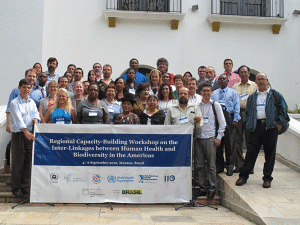The participants of the workshop suggested the following activities:
- To continue collaboration between Convention on Biological Diversity and the World Health Organization to develop joint activities that will encourage inter-sectoral communication and support the implementation of the Strategic Plan for Biodiversity 2011-2020 and the Aichi Biodiversity Targets;
- To incorporate the relationships between human health and biodiversity in the updating of National Biodiversity Strategies and Action Plans (NBSAPs) and national health strategies as a means for fulfilling the Strategic Plan for Biodiversity 2011-2020;
- To update, publish and distribute widely the draft discussion paper sent to participants in preparation for the regional workshop on the inter-linkages between biodiversity and health;
- To strengthen collaboration between the Convention on Biological Diversity and international bodies that deal with food and food security, given their important links with health and biodiversity;
- To include the role of communities, particularly indigenous and local community women as managers, protectors and transmitters of traditional knowledge, on health and food security;
- To emphasize the issues of health and traditional knowledge in the context of the Convention on Biological Diversity, taking into account the objectives of the Convention, Article 8(j), Article 10(c), Bonn Guidelines on Access to Genetic Resources and Distribution of Benefits, Akwé: Kon voluntary guidelines, Addis Ababa Principles and Guidelines for the Sustainable Use of Biodiversity and the Nagoya Protocol on Access to Genetic Resources and the Fair and Equitable Sharing of Benefits Arising from their Utilization to the Convention on Biological Diversity, as appropriate;
- To carry out national and regional workshops like this one, as well as national workshops, with all relevant stakeholders, including indigenous and local communities, for the continuing promotion of information exchange and collaboration on key issues relevant to biodiversity and health;
- To share national and regional experiences that support the development of linkages between biodiversity and health through the exchange of information with the aim of developing a regional observatory to facilitate networking and decision-making;
- To strengthen epidemiological surveillance systems that also consider ecological and biodiversity indicators;
- To create and/or strengthen surveillance systems that include indicators to measure the benefit of biodiversity protection and conservation relating to the control of communicable and non-communicable diseases through water, soil, air, and/or food;
- To encourage communication and intersectoral collaboration in this area, especially between Ministries of Health and Ministries of Environment and other key stakeholders;
- To develop communication tools and culturally appropriate information to share experiences and practices in health and biodiversity which can be assessed, disseminated and implemented;
- To incorporate the issue of indigenous and traditional health taking into account stakeholders from indigenous and local communities;
- To recognize traditional knowledge, among other valid systems of knowledge, for information on biodiversity and health.
- To promote the exchange of information, knowledge and experiences among countries to develop integrated tools of territorial planning and the management of hydrological basins;
- To include health and biodiversity variables in environmental impact assessments;
To promote the characterization of ecological risk zones for zoonotic diseases transmitted by vectors and invasive species. |


